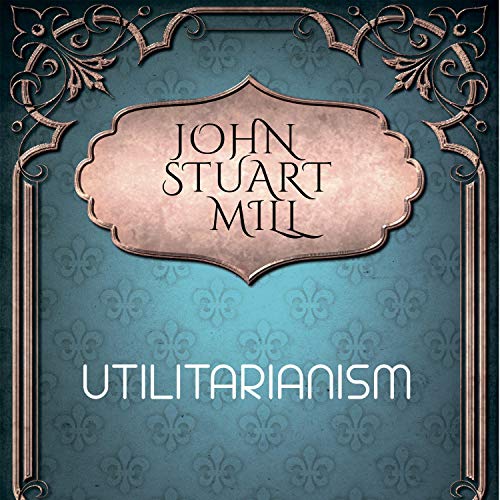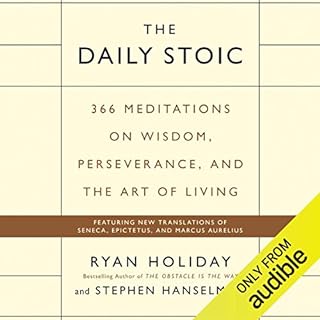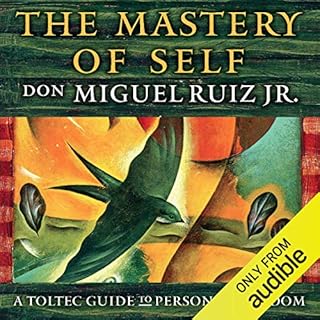
Utilitarianism
No se pudo agregar al carrito
Add to Cart failed.
Error al Agregar a Lista de Deseos.
Error al eliminar de la lista de deseos.
Error al añadir a tu biblioteca
Error al seguir el podcast
Error al dejar de seguir el podcast
 Exclusivo para miembros Prime: ¿Nuevo en Audible? Obtén 2 audiolibros gratis con tu prueba.
Exclusivo para miembros Prime: ¿Nuevo en Audible? Obtén 2 audiolibros gratis con tu prueba.Compra ahora por $3.90
No default payment method selected.
We are sorry. We are not allowed to sell this product with the selected payment method
-
Narrado por:
-
Jamey Lewis
-
De:
-
John Stuart Mill
Acerca de esta escucha
An influential contributor to social theory, political theory, and political economy, his conception of liberty justified the freedom of the individual in opposition to unlimited state control. He was a proponent of utilitarianism, an ethical theory developed by Jeremy Bentham, although his conception of it was very different from Bentham's. Hoping to remedy the problems found in an inductive approach to science, such as confirmation bias, he clearly set forth the premises of falsification as the key component in the scientific method.
Mill was also a Member of Parliament and an important figure in liberal political philosophy. John Stuart Mill’s view on liberty, which was influenced by Joseph Priestley and Josiah Warren, is that the individual ought to be free to do as he wishes unless he harms others. Individuals are rational enough to make decisions about their good being and choose any religion they want to. Government should interfere when it is for the protection of society.
Mill explains, “The sole end for which mankind are warranted, individually or collectively, in interfering with the liberty of action of any of their number, is self-protection. That the only purpose for which power can be rightfully exercised over any member of a civilized community, against his will, is to prevent harm to others. His own good, either physical or moral, is not sufficient warrant. He cannot rightfully be compelled to do or forbear because it will be better for him to do so, because it will make him happier, because, in the opinion of others, to do so would be wise, or even right...
The only part of the conduct of anyone, for which he is amenable to society, is that which concerns others. In the part which merely concerns him, his independence is, of right, absolute. Over himself, over his own body and mind, the individual is sovereign.”
©2020 Strelbytskyy Multimedia Publishing (P)2020 Strelbytskyy Multimedia PublishingLos oyentes también disfrutaron...
-
Conjectures and Refutations
- The Growth of Scientific Knowledge
- De: Karl Popper
- Narrado por: Martyn Swain
- Duración: 22 h y 14 m
- Versión completa
-
General5 out of 5 stars 19
-
Narración:5 out of 5 stars 14
-
Historia5 out of 5 stars 14
Conjectures and Refutations is one of Karl Popper’s most wide-ranging and popular works, notable not only for its acute insights into the way scientific knowledge grows, but also for applying those insights to politics and to history. It provides one of the clearest and most accessible statements of the fundamental idea that guided his work: not only our knowledge but our aims and our standards grow through an unending process of trial and error.
-
5 out of 5 stars
-
Essential for Age of AI
- De Chris Mays en 08-08-23
De: Karl Popper
-
Groundwork of the Metaphysics of Morals
- De: Immanuel Kant
- Narrado por: James Hugg
- Duración: 3 h y 38 m
- Versión completa
-
General4 out of 5 stars 16
-
Narración:4.5 out of 5 stars 13
-
Historia4 out of 5 stars 12
Groundwork of the Metaphysics of Morals (1785) is the first of Immanuel Kant's mature works on moral philosophy and remains one of the most important in the field. Kant examines the core concepts and principles of moral theory, showing that they are normative for rational agents. He aspires to lay bare the fundamental principle of morality and prove that it applies to us. Kant offers the argument that the rightness of an action is determined by the character of the principle that a person chooses to act upon.
-
2 out of 5 stars
-
Fine reading but quality of recording …meh
- De Jacob Whalen en 12-17-24
De: Immanuel Kant
-
The Structure of Scientific Revolutions
- De: Thomas S. Kuhn
- Narrado por: Dennis Holland
- Duración: 10 h y 14 m
- Versión completa
-
General4 out of 5 stars 1,156
-
Narración:4 out of 5 stars 834
-
Historia4 out of 5 stars 816
A good book may have the power to change the way we see the world, but a great book actually becomes part of our daily consciousness, pervading our thinking to the point that we take it for granted, and we forget how provocative and challenging its ideas once were - and still are. The Structure of Scientific Revolutions is that kind of book.
-
3 out of 5 stars
-
The problem is not with the book
- De Marcus en 08-09-09
De: Thomas S. Kuhn
-
Fundamental Principles of the Metaphysics of Morals
- De: Immanuel Kant, Thomas Kingsmill Abbott - translator
- Narrado por: John Lee
- Duración: 3 h y 20 m
- Versión completa
-
General4.5 out of 5 stars 218
-
Narración:4.5 out of 5 stars 188
-
Historia4.5 out of 5 stars 185
Immanuel Kant's Fundamental Principles of the Metaphysics of Morals, first published in 1785, lays out Kant's essential philosophy and defines the concepts and arguments that would shape his later work. Central to Kant's doctrine is the categorical imperative, which he defines as a mandate that human actions should always conform to a universal, unchanging standard of rational morality.
-
4 out of 5 stars
-
Categorical Imperatives for Everyone
- De Darwin8u en 04-04-17
De: Immanuel Kant, y otros
-
Grounding for the Metaphysics of Morals
- De: Immanuel Kant
- Narrado por: John Riddle
- Duración: 3 h y 52 m
- Versión completa
-
General5 out of 5 stars 3
-
Narración:5 out of 5 stars 2
-
Historia5 out of 5 stars 2
Groundwork of the Metaphysics of Morals is the first of Immanuel Kant's mature works on moral philosophy and remains one of the most influential in the field. Kant conceives his investigation as a work of foundational ethics - one that clears the ground for future research by explaining the core concepts and principles of moral theory, and showing that they are normative for rational agents.
De: Immanuel Kant
-
The Communist Manifesto
- De: Karl Marx
- Narrado por: Greg Wagland
- Duración: 1 h y 34 m
- Versión completa
-
General4 out of 5 stars 1,274
-
Narración:4.5 out of 5 stars 1,089
-
Historia4 out of 5 stars 1,076
‘It was a sweet finish after the bitter pills of floggings and bullets with which these same governments, just at that time, dosed the German working-class risings’. The Communist Manifesto is, perhaps surprisingly, a most engaging and accessible work, containing even the odd shaft of humour in this translation by Samuel Moore for the 1888 English edition.
-
5 out of 5 stars
-
Forcibly over throw anyone who owns land?
- De Austin Hair en 02-13-20
De: Karl Marx
-
Conjectures and Refutations
- The Growth of Scientific Knowledge
- De: Karl Popper
- Narrado por: Martyn Swain
- Duración: 22 h y 14 m
- Versión completa
-
General5 out of 5 stars 19
-
Narración:5 out of 5 stars 14
-
Historia5 out of 5 stars 14
Conjectures and Refutations is one of Karl Popper’s most wide-ranging and popular works, notable not only for its acute insights into the way scientific knowledge grows, but also for applying those insights to politics and to history. It provides one of the clearest and most accessible statements of the fundamental idea that guided his work: not only our knowledge but our aims and our standards grow through an unending process of trial and error.
-
5 out of 5 stars
-
Essential for Age of AI
- De Chris Mays en 08-08-23
De: Karl Popper
-
Groundwork of the Metaphysics of Morals
- De: Immanuel Kant
- Narrado por: James Hugg
- Duración: 3 h y 38 m
- Versión completa
-
General4 out of 5 stars 16
-
Narración:4.5 out of 5 stars 13
-
Historia4 out of 5 stars 12
Groundwork of the Metaphysics of Morals (1785) is the first of Immanuel Kant's mature works on moral philosophy and remains one of the most important in the field. Kant examines the core concepts and principles of moral theory, showing that they are normative for rational agents. He aspires to lay bare the fundamental principle of morality and prove that it applies to us. Kant offers the argument that the rightness of an action is determined by the character of the principle that a person chooses to act upon.
-
2 out of 5 stars
-
Fine reading but quality of recording …meh
- De Jacob Whalen en 12-17-24
De: Immanuel Kant
-
The Structure of Scientific Revolutions
- De: Thomas S. Kuhn
- Narrado por: Dennis Holland
- Duración: 10 h y 14 m
- Versión completa
-
General4 out of 5 stars 1,156
-
Narración:4 out of 5 stars 834
-
Historia4 out of 5 stars 816
A good book may have the power to change the way we see the world, but a great book actually becomes part of our daily consciousness, pervading our thinking to the point that we take it for granted, and we forget how provocative and challenging its ideas once were - and still are. The Structure of Scientific Revolutions is that kind of book.
-
3 out of 5 stars
-
The problem is not with the book
- De Marcus en 08-09-09
De: Thomas S. Kuhn
-
Fundamental Principles of the Metaphysics of Morals
- De: Immanuel Kant, Thomas Kingsmill Abbott - translator
- Narrado por: John Lee
- Duración: 3 h y 20 m
- Versión completa
-
General4.5 out of 5 stars 218
-
Narración:4.5 out of 5 stars 188
-
Historia4.5 out of 5 stars 185
Immanuel Kant's Fundamental Principles of the Metaphysics of Morals, first published in 1785, lays out Kant's essential philosophy and defines the concepts and arguments that would shape his later work. Central to Kant's doctrine is the categorical imperative, which he defines as a mandate that human actions should always conform to a universal, unchanging standard of rational morality.
-
4 out of 5 stars
-
Categorical Imperatives for Everyone
- De Darwin8u en 04-04-17
De: Immanuel Kant, y otros
-
Grounding for the Metaphysics of Morals
- De: Immanuel Kant
- Narrado por: John Riddle
- Duración: 3 h y 52 m
- Versión completa
-
General5 out of 5 stars 3
-
Narración:5 out of 5 stars 2
-
Historia5 out of 5 stars 2
Groundwork of the Metaphysics of Morals is the first of Immanuel Kant's mature works on moral philosophy and remains one of the most influential in the field. Kant conceives his investigation as a work of foundational ethics - one that clears the ground for future research by explaining the core concepts and principles of moral theory, and showing that they are normative for rational agents.
De: Immanuel Kant
-
The Communist Manifesto
- De: Karl Marx
- Narrado por: Greg Wagland
- Duración: 1 h y 34 m
- Versión completa
-
General4 out of 5 stars 1,274
-
Narración:4.5 out of 5 stars 1,089
-
Historia4 out of 5 stars 1,076
‘It was a sweet finish after the bitter pills of floggings and bullets with which these same governments, just at that time, dosed the German working-class risings’. The Communist Manifesto is, perhaps surprisingly, a most engaging and accessible work, containing even the odd shaft of humour in this translation by Samuel Moore for the 1888 English edition.
-
5 out of 5 stars
-
Forcibly over throw anyone who owns land?
- De Austin Hair en 02-13-20
De: Karl Marx
Relacionado con este tema
-
The Art of War
- De: Sun Tzu
- Narrado por: Aidan Gillen
- Duración: 1 h y 7 m
- Versión completa
-
General4.5 out of 5 stars 41,738
-
Narración:4.5 out of 5 stars 34,578
-
Historia4.5 out of 5 stars 34,159
The 13 chapters of The Art of War, each devoted to one aspect of warfare, were compiled by the high-ranking Chinese military general, strategist, and philosopher Sun-Tzu. In spite of its battlefield specificity, The Art of War has found new life in the modern age, with leaders in fields as wide and far-reaching as world politics, human psychology, and corporate strategy finding valuable insight in its timeworn words.
-
5 out of 5 stars
-
The actual book The Art of War, not a commentary
- De Nemo71 en 12-31-19
De: Sun Tzu
-
My Big TOE: Awakening
- Book One of a Trilogy Unifying Philosophy, Physics, and Metaphysics
- De: Thomas Campbell
- Narrado por: Thomas Campbell
- Duración: 11 h y 11 m
- Versión completa
-
General4.5 out of 5 stars 503
-
Narración:4.5 out of 5 stars 435
-
Historia4.5 out of 5 stars 430
My Big TOE: Awakening, written by a nuclear physicist in the language of contemporary culture, unifies science and philosophy, physics and metaphysics, mind and matter, purpose and meaning, the normal and the paranormal. The entirety of human experience (mind, body, and spirit) including both our objective and subjective worlds is brought together under one seamless scientific understanding.
-
2 out of 5 stars
-
What a Trip (but to where?)
- De Michael en 11-26-13
De: Thomas Campbell
-
The Daily Stoic
- 366 Meditations on Wisdom, Perseverance, and the Art of Living
- De: Ryan Holiday, Stephen Hanselman
- Narrado por: Brian Holsopple
- Duración: 10 h y 6 m
- Versión completa
-
General5 out of 5 stars 3,262
-
Narración:4.5 out of 5 stars 2,738
-
Historia5 out of 5 stars 2,703
Why have history's greatest minds - from George Washington to Frederick the Great to Ralph Waldo Emerson along with today's top performers, from Super Bowl-winning football coaches to CEOs and celebrities - embraced the wisdom of the ancient Stoics? Because they realize that the most valuable wisdom is timeless and that philosophy is for living a better life, not a classroom exercise. The Daily Stoic offers a daily devotional of Stoic insights and exercises, featuring all-new translations.
-
2 out of 5 stars
-
Not well made as audio
- De Andreas en 12-27-16
De: Ryan Holiday, y otros
-
The Mastery of Self
- A Toltec Guide to Personal Freedom
- De: Don Miguel Ruiz Jr.
- Narrado por: Charlie Varon
- Duración: 3 h y 30 m
- Versión completa
-
General5 out of 5 stars 4,474
-
Narración:5 out of 5 stars 3,716
-
Historia5 out of 5 stars 3,696
The ancient Toltecs believed that life, as we perceive it, is a dream. We each live in our own personal dream, and these come together to form the dream of the planet, or the world in which we live. Problems arise when our perception of the dream becomes clouded with negativity, drama, and judgment (of ourselves and others), because it's in these moments of suffering that we have forgotten that we are the architects of our own reality and we have the power to change our dream if we choose.
-
5 out of 5 stars
-
listen.. .then listen again
- De Casiano en 12-22-16
-
The Thin Line
- Hope vs. Reality in the Era of Weight-Loss Drugs
- De: Scaachi Koul
- Narrado por: Scaachi Koul
- Duración: 4 h y 31 m
- Grabación Original
-
General4.5 out of 5 stars 105
-
Narración:5 out of 5 stars 102
-
Historia4.5 out of 5 stars 102
Over the next five years, millions of more Americans are expected to take Ozempic and other GLP-1 weight-loss drugs, which are rapidly being recognized as the miracle drugs of this century. If you’re not on them, you’ll probably know someone who is. What are the implications of the widespread use of these drugs, both on our bodies and our society? In this show, you’ll meet people across America who are either taking the jab or thinking about it, and the shocking intentional and unintentional results they are seeing.
-
5 out of 5 stars
-
More balanced than expected and very comprehensive
- De Summer Rodriguez en 01-03-25
De: Scaachi Koul
-
The Autobiography of Malcolm X
- As Told to Alex Haley
- De: Malcolm X, Alex Haley
- Narrado por: Laurence Fishburne
- Duración: 16 h y 52 m
- Versión completa
-
General5 out of 5 stars 12,543
-
Narración:5 out of 5 stars 11,159
-
Historia5 out of 5 stars 11,100
Experience a bold take on this classic autobiography as it’s performed by Oscar-nominated Laurence Fishburne. In this searing classic autobiography, originally published in 1965, Malcolm X, the Muslim leader, firebrand, and Black empowerment activist, tells the extraordinary story of his life and the growth of the Human Rights movement. His fascinating perspective on the lies and limitations of the American dream and the inherent racism in a society that denies its non-White citizens the opportunity to dream, gives extraordinary insight into the most urgent issues of our own time.
-
4 out of 5 stars
-
it's Nearly perfect
- De Kerry en 09-16-20
De: Malcolm X, y otros
-
The Art of War
- De: Sun Tzu
- Narrado por: Aidan Gillen
- Duración: 1 h y 7 m
- Versión completa
-
General4.5 out of 5 stars 41,738
-
Narración:4.5 out of 5 stars 34,578
-
Historia4.5 out of 5 stars 34,159
The 13 chapters of The Art of War, each devoted to one aspect of warfare, were compiled by the high-ranking Chinese military general, strategist, and philosopher Sun-Tzu. In spite of its battlefield specificity, The Art of War has found new life in the modern age, with leaders in fields as wide and far-reaching as world politics, human psychology, and corporate strategy finding valuable insight in its timeworn words.
-
5 out of 5 stars
-
The actual book The Art of War, not a commentary
- De Nemo71 en 12-31-19
De: Sun Tzu
-
My Big TOE: Awakening
- Book One of a Trilogy Unifying Philosophy, Physics, and Metaphysics
- De: Thomas Campbell
- Narrado por: Thomas Campbell
- Duración: 11 h y 11 m
- Versión completa
-
General4.5 out of 5 stars 503
-
Narración:4.5 out of 5 stars 435
-
Historia4.5 out of 5 stars 430
My Big TOE: Awakening, written by a nuclear physicist in the language of contemporary culture, unifies science and philosophy, physics and metaphysics, mind and matter, purpose and meaning, the normal and the paranormal. The entirety of human experience (mind, body, and spirit) including both our objective and subjective worlds is brought together under one seamless scientific understanding.
-
2 out of 5 stars
-
What a Trip (but to where?)
- De Michael en 11-26-13
De: Thomas Campbell
-
The Daily Stoic
- 366 Meditations on Wisdom, Perseverance, and the Art of Living
- De: Ryan Holiday, Stephen Hanselman
- Narrado por: Brian Holsopple
- Duración: 10 h y 6 m
- Versión completa
-
General5 out of 5 stars 3,262
-
Narración:4.5 out of 5 stars 2,738
-
Historia5 out of 5 stars 2,703
Why have history's greatest minds - from George Washington to Frederick the Great to Ralph Waldo Emerson along with today's top performers, from Super Bowl-winning football coaches to CEOs and celebrities - embraced the wisdom of the ancient Stoics? Because they realize that the most valuable wisdom is timeless and that philosophy is for living a better life, not a classroom exercise. The Daily Stoic offers a daily devotional of Stoic insights and exercises, featuring all-new translations.
-
2 out of 5 stars
-
Not well made as audio
- De Andreas en 12-27-16
De: Ryan Holiday, y otros
-
The Mastery of Self
- A Toltec Guide to Personal Freedom
- De: Don Miguel Ruiz Jr.
- Narrado por: Charlie Varon
- Duración: 3 h y 30 m
- Versión completa
-
General5 out of 5 stars 4,474
-
Narración:5 out of 5 stars 3,716
-
Historia5 out of 5 stars 3,696
The ancient Toltecs believed that life, as we perceive it, is a dream. We each live in our own personal dream, and these come together to form the dream of the planet, or the world in which we live. Problems arise when our perception of the dream becomes clouded with negativity, drama, and judgment (of ourselves and others), because it's in these moments of suffering that we have forgotten that we are the architects of our own reality and we have the power to change our dream if we choose.
-
5 out of 5 stars
-
listen.. .then listen again
- De Casiano en 12-22-16
-
The Thin Line
- Hope vs. Reality in the Era of Weight-Loss Drugs
- De: Scaachi Koul
- Narrado por: Scaachi Koul
- Duración: 4 h y 31 m
- Grabación Original
-
General4.5 out of 5 stars 105
-
Narración:5 out of 5 stars 102
-
Historia4.5 out of 5 stars 102
Over the next five years, millions of more Americans are expected to take Ozempic and other GLP-1 weight-loss drugs, which are rapidly being recognized as the miracle drugs of this century. If you’re not on them, you’ll probably know someone who is. What are the implications of the widespread use of these drugs, both on our bodies and our society? In this show, you’ll meet people across America who are either taking the jab or thinking about it, and the shocking intentional and unintentional results they are seeing.
-
5 out of 5 stars
-
More balanced than expected and very comprehensive
- De Summer Rodriguez en 01-03-25
De: Scaachi Koul
-
The Autobiography of Malcolm X
- As Told to Alex Haley
- De: Malcolm X, Alex Haley
- Narrado por: Laurence Fishburne
- Duración: 16 h y 52 m
- Versión completa
-
General5 out of 5 stars 12,543
-
Narración:5 out of 5 stars 11,159
-
Historia5 out of 5 stars 11,100
Experience a bold take on this classic autobiography as it’s performed by Oscar-nominated Laurence Fishburne. In this searing classic autobiography, originally published in 1965, Malcolm X, the Muslim leader, firebrand, and Black empowerment activist, tells the extraordinary story of his life and the growth of the Human Rights movement. His fascinating perspective on the lies and limitations of the American dream and the inherent racism in a society that denies its non-White citizens the opportunity to dream, gives extraordinary insight into the most urgent issues of our own time.
-
4 out of 5 stars
-
it's Nearly perfect
- De Kerry en 09-16-20
De: Malcolm X, y otros













